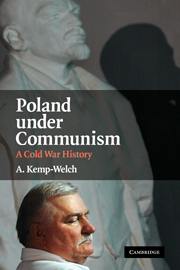12 - Martial law
Published online by Cambridge University Press: 06 January 2010
Summary
There would be nothing more fatal for Poland than to have a traitor at the head of the Government.
Jean-Jacques Rousseau, 1772Poland continued to be central to super-power relations throughout 1981. Recalling the first year of Reagan's Presidency, his CIA chief notes: ‘Nothing in foreign affairs took as much time and energy as the Polish crisis, which dominated the foreign policy agenda from Inauguration Day [20 January 1981] nearly until Christmas. And none would have as important consequences for the future as did Poland.’
President Carter's valedictory message to Congress highlighted the unfinished problem:
Now, as was the case a year ago, the prospect of Soviet use of force threatens the international order. The Soviet Union has completed preparations for a possible military intervention against Poland. Although the situation in Poland has shown signs of stabilising recently, Soviet forces remain in a high state of readiness and they could move into Poland on a short notice.
He re-asserted the basic American position that ‘the Polish people should be allowed to work out their internal problems themselves, without outside interference’ and added the admonition: ‘we have made clear to the Soviet leadership that any intervention in Poland would have severe and prolonged consequences for East–West détente, and US–Soviet relations in particular’.
The Reagan line was continuity. The USA would seek to discourage Polish insurrection by making clear that Western military assistance would not be forthcoming: ‘We should avoid any statement or action that might encourage a hopeless armed resistance on the part of the Polish people.
- Type
- Chapter
- Information
- Poland under CommunismA Cold War History, pp. 302 - 331Publisher: Cambridge University PressPrint publication year: 2008

